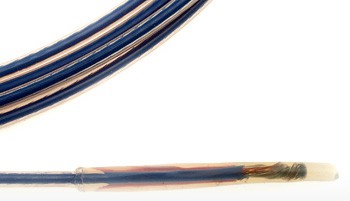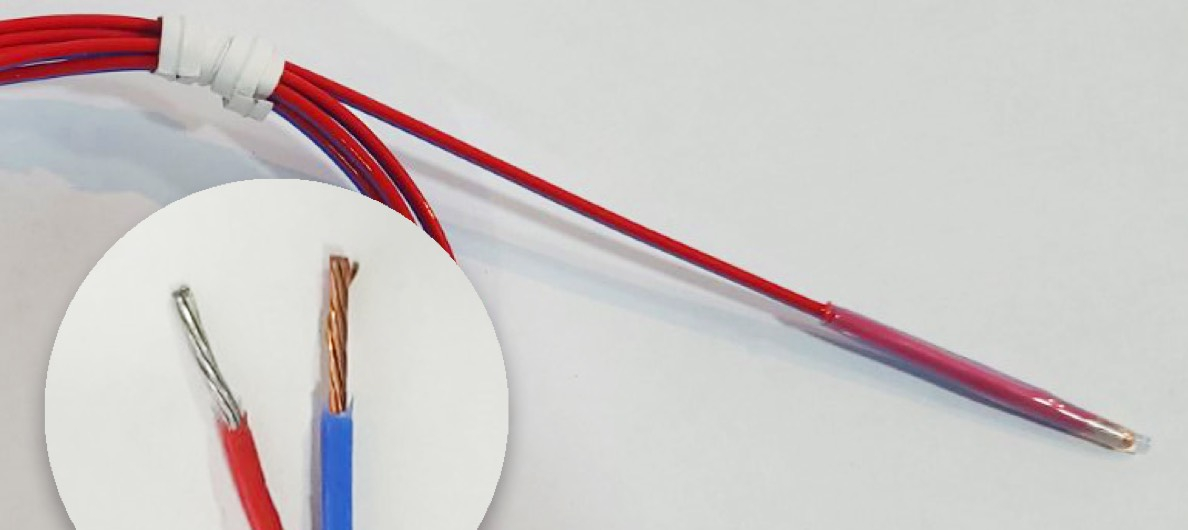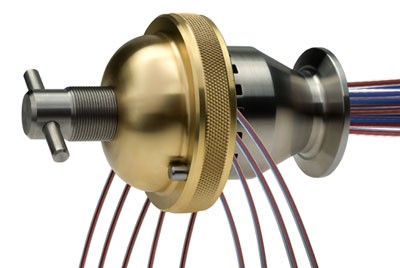- Home
- en
- calibrators
- thermocouples
Type T thermocouples
Our type T thermocouples are ideal for use in steam autoclaves, CIP/SIP, WFI, incubators, refrigerators and freezers, applications with liquid nitrogen, freeze dryers and other demanding environments at extreme temperatures.
In demanding applications, thermocouples are subject to high thermal stress and often rough handling by the user. Repeated bending or cold forming of a thermocouple can lead to stress and deformation of the crystalline structure of the wire and thus to measurement errors. Our thermocouples are made of wires of the highest material purity and uniformity to minimize measurement errors due to cold forming and material inconsistencies.
Benefit from the highest quality of our type T thermocouples:
- Highest material purity and uniformity
- Maximum measuring accuracy
- For extreme temperature ranges
- Resilience and durability
- Individual lengths

Ultra-Premium type "T" thermocouple
Get free samples of our thermocouples!
The best on the market - the ultra-premium thermocouples from CiK Solutions.Take our word for it and test our thermocouples for your applications.
Request a free sample without obligation!
Versions of type T thermocouples
Our type T thermocouple wire is available in 3- and 7-pole versions and is encased in clear PTFE overall insulation.
The three-strand wire is used where space is limited or where the wire has to be fed through narrow openings such as plastic tubing or in a small filter housing. It has an outer diameter of 1.88 mm and can be used in liquid nitrogen (-196 ºC) up to a temperature of 200 ºC. The seven-core wire has an outer diameter of 3.05 mm and is used where additional strength is required.
- 3-core stranded wire: Ideal when wire flexibility and diameter play an important role, e.g. when feeding through door seals.
- 7-plait stranded wire: Used when robustness and stability are paramount.
Thermocouples with Kapton sheathing for temperatures up to 350 °C on request (can only be used in dry conditions).
- +
What is a thermocouple?
Thomas Johann Seebeck discovered that if you connect two conductors of different materials together and change the temperature at this connection point, a voltage drop occurs at the other end of the conductors, which is directly related to the temperature change. Due to this Seebeck effect (also known as the thermoelectric effect), it is therefore possible to build a measuring sensor (= thermocouple) with two wires of different materials.
For different temperature ranges and accuracy classes, there are 8 material combinations that play a role and are also listed in standards such as IEC60584 and ASTM E230. The different thermocouples are labeled with the letters J, K, E, T, R, S, B and N.
When using thermocouples to measure temperature, cold junction compensation must be taken into account. As described above, the thermoelectric effect is based on the fact that two different materials (e.g. copper and constantan) generate a voltage at the measuring tip - i.e. on the "hot" side - of the thermocouple. However, as a thermocouple wire must also be connected to a measuring device whose electrical connections are generally made of copper, a thermoelectric effect also occurs on this "cold" side of the thermocouple, as two different materials also come together there. Therefore, the voltage drop occurring at the measuring tip must be compensated for by the voltage drop occurring on the measuring device side.
| 3-fold stranded wire | 7-fold stranded wire | |
|
Type |
Type "T" thermocouples |
Type "T" thermocouples |
|
Thermocouple quality |
Ultrapremium |
Ultrapremium |
|
wire |
Copper constantan |
Copper constantan |
|
Sheathing |
transparent Teflon® |
transparent Teflon® |
|
Temperature range |
-196 °C to +200 °C |
-196 °C to +200 °C |
|
Accuracy at 40 °C at 121 °C |
±0,1 °C ±0,3 °C |
±0,1 °C ±0,25 °C |
|
Maximum outer diameter |
1.88 mm |
3,05 mm |
|
Lengths |
4, 6, 10 meters and individual lengths |
4, 6, 10 meters and individual lengths |
Autobond thermocouples
Our Autobond thermocouples have been developed for all applications involving extreme humidity. Especially in steam applications (sterilization) under pressure, condensation moisture penetrating through the insulation can become a problem. The specially manufactured ultra-premium grade Autobond thermocouples reduce the ingress of condensation by up to 90% compared to conventional standard insulation.
The Autobond thermocouples have the same accuracy and uniformity specifications as the standard ultra-premium wire and are available as standard 22 AWG 7 strand wire. The Autobond wire can be used for any application and has an approximate temperature range of -200°C to +200°C.

Stainless steel thermocouple feed-through
The TÜV-certified stainless steel feed-through from CiK Solutions is ideal for inserting thermocouples into pressure vessels such as steam autoclaves, process lines, etc. in a simple, orderly and sealed manner. Up to 18 thermocouples can be inserted individually into the feedthrough, the cover is fitted using an elegant bayonet lock with safety interlock - and that's it.


Maximum tightness can be achieved using a silicone double seal combined with a pressure screw. The feedthrough can be used up to a maximum pressure of 5 bar and a maximum temperature of 150 °C. The connection to the pressure vessel is made via a standardized 1 ½ " Tri-Clamp clamp connection.
The stainless steel feedthrough is simple, neat and compact and is ideal for thermocouple applications in high pressure or vacuum environments such as steam autoclaves, process lines etc. Up to 18 individual thermocouples can be used in the design, mounted on an elegant, securely locked bayonet fitting. Maximum pressure is achieved by a double silicone seal in combination with a pressure screw.

